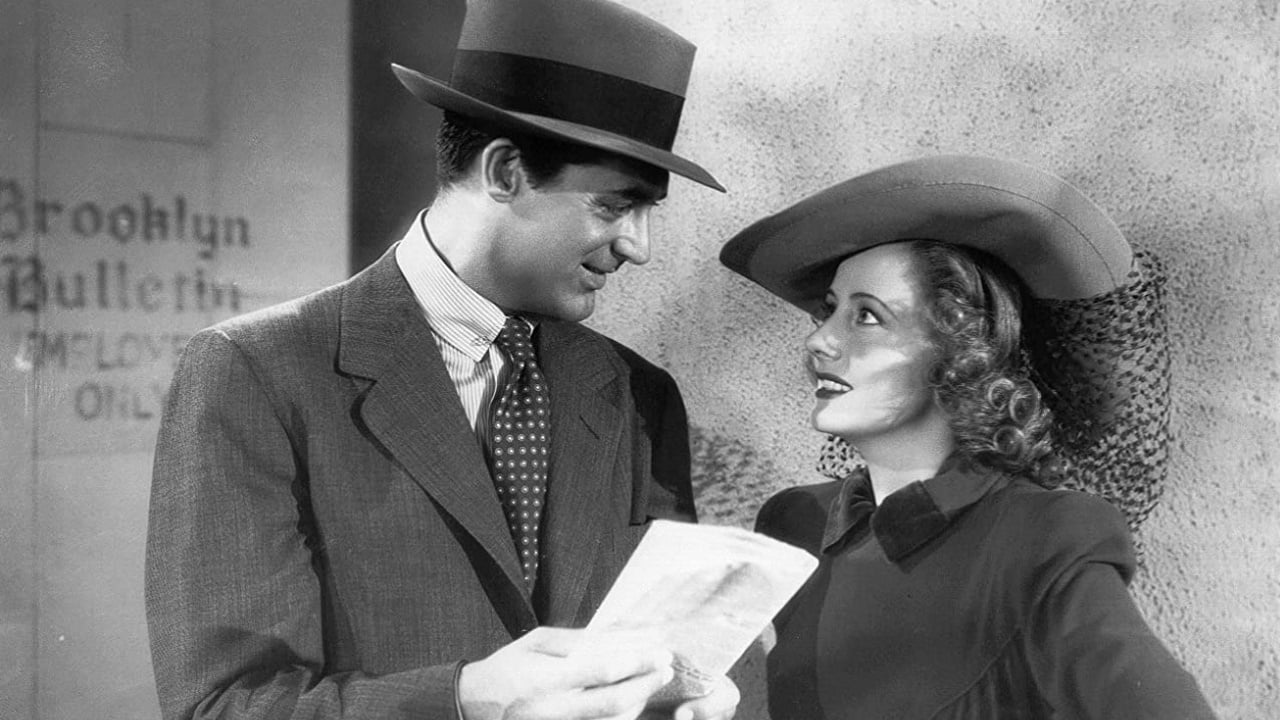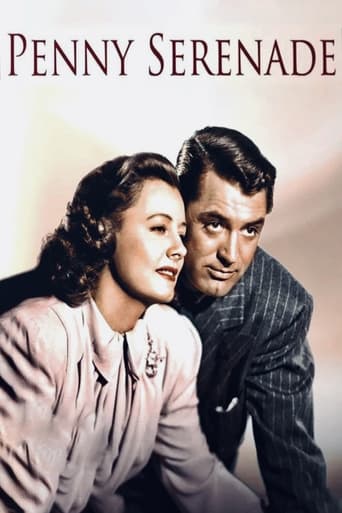

PENNY SERENADE (Columbia, 1941), directed by George Stevens, is not a musical in the tradition of similar sounding titles of the period as "Broadway Serenade" (MGM, 1939), "Sun Valley Serenade" (20th-Fox, 1941), "Footlight Serenade" (20th-Fox, 1942), "Lake Placid Serenade" (Republic, 1944), among others, but a dramatic story involving two young people. Having made audiences laugh in THE AWFUL TRUTH (Columbia, 1937), and MY FAVORITE WIFE (RKO Radio, 1940), Irene Dunne and Cary Grant team together for the third and final encore that offers humor, sentiment and tearful moments that rank this their most popular of the three for which they appeared.PENNY SERENADE begins with Julie Adams (Irene Dunne)returning home with her decision of leaving her husband, Roger (Cary Grant). Before packing, her collection of records in a scrapbook titled "The Story of a Happy Marriage" sets Julie through her "Penny Serenade" as she reminisces while listening to old tunes connected to various chapters of her life. The first song, "You Were Meant For Me," introduced in the late twenties, is the recording played in a music shop where Roger passes by, taking an interest in one of its workers, Julie Gardiner. After buying 27 records without even owning a phonograph, Julie realizes his intention, followed by a six month courtship and finally marriage. Roger, a newspaperman by profession, is assigned to a new job as correspondent in Japan, where he takes his new bride. "Poor Butterfly" becomes the tune associated with their stay in Japan where an earthquake causes the miscarriage of Julie's unborn child. Unable to birth any more children, the couple settle in San Francisco where Roger establishes his own newspaper business, The Rosalia Weekly Courier, becoming his own boss and publisher. Applejack Carney (Edgar Buchanan), a close friend of the couple, arrives from Brooklyn to assist Roger as press agent, better known as printer. Through Applejack's suggestion, the couple consider adopting a child of their own, and through the kindness of Miss Oliver (Beulah Bondi), head of the adoption agency, the couple do adopt a child. All goes well for the next few years until an unforeseen circumstance takes place that puts a burden on their marriage.With flashback episodes tied together with musical chronology through much of its 118 minutes, the only debit to PENNY SERENADE is having Irene Dunne appearing in 1941 head-dress and costumes in segments not accurate to the actual time-frame of the 1920s and 30s. While Dunne deserved an Academy Award for her sensitive performance, it was Cary Grant who was singled out for that honor as Best Actor. Grant's nomination, no doubt, comes from his moving appeal to the stern judge (Wallis Clark) not to have his child taken away due to his lack of financial support. Who wouldn't be moved by this and Beulah Bondi's excellent support. Another standout is Edgar Buchanan, who should have been nominated in the supporting actor category, especially for one delightful scene where he demonstrates to the adoptive parents how to bathe an infant. Not to disappoint fans of either Dunne or Grant, they do share some moments of comedy, such as their initial meeting, courtship, and their first night after bringing home their adopted baby and what not to do to disturb her sleep.Others in the cast worth noting are: Ann Doran (Dotty); Leonard Wiley (Doctor Hartley) and Eve Tee Kuneye as Little Trina, whose upside down smile and echo rendition to "Silent Night" in a Christmas play certainly makes this worth viewing. It's also the reason why PENNY SERENADE often plays on television during the Christmas season.A public domain title, PENNY SERENADE was certainly one movie easily accessible in the early 1980s during the advent of video cassette rentals and cable television broadcasts. Since then, it's been presented on many cable networks as American Movie Classics, Turner Classic Movies (with restored Columbia Pictures logo inserted prior to closing credits which have been missing for many years), and, in some cases, public television. It's also available on DVD in both black and white and colorized formats.While PENNY SERENADE has an original premise not commonly found in movies up to this time, it's certainly a sentimental journey back to the days when movies captured your heart through the involvement of a young couple going through trials and tribulations in their daily lives, and getting to wonder whether or not they are really meant for each other. (****)
... View MoreJulie's marriage to Roger is on the rocks and they are about to separate. When she is by herself, she plays a succession of records associated with different stages of her relationship with Roger. With the playing of each record, the tune becomes the background music of a flashback, beginning with when they first met, and at important stages in their lives. But the flashbacks show us what a great marriage they have, so we figure something really bad must have happened to cause these two to separate. After an accident, Julie is no longer able to have children, so they adopt a girl. At first I thought that somehow Roger was going to be responsible for her death, by accidentally running over her when she runs out into the street. She does die, but it is clearly not anyone's fault, not even accidentally so. Furthermore, her death is not even seen, but only mentioned in a letter, followed by scenes of the two of them being silent and sad. We never really believe that they are going to get divorced, and they don't.The plot of this movie is similar to "The Marrying Kind" (1952), where another couple is about to get a divorce. Instead of records playing tunes from the past, the divorce judge, who can see that they have a good marriage, questions them, and their story is told in flashbacks, revealing what a good marriage they have, making us wonder when we are going to get to the part that made them so miserable. Once again, we find that a child died, this time by drowning; once again it is an accident for which neither of them can be thought to be responsible; and once again we can see that this is something that they will eventually get over, and so they do not get the divorce.The moral of these stories seems to be that people who are in an unhappy marriage should stay together and work things out. There is something irritating about the way both movies are dismissive of just how miserable a marriage can be, as if married couples who want a divorce simply don't realize how much they really love each other.
... View MoreFirst and foremost, the idea of telling the whole movie through flashback was brilliant. Every record represented a different time and brought back significant memories. The wipe with in the record to the next scene was a bit awkward sometimes, but it was 1941. The movie was actually quite good but the ending was very off putting. I wouldn't say it ruined my entire experience, but it certainly came close. I was right with these characters the entire time until the writer decided to "jump to shark". It is a happy ending but definitely not realistic. Their solution to the problem was more suited to replacing the family dog, not their child.
... View MoreWith a well organized story line and a decent amount of sympathy this film comes across to me as the ever so common love story. Most of this is due to the fact that a movie like this one comes to theaters about 5 times a year now a days, but put in perspective of the early 1940's and you got yourself a film with quite uniqueness. The amount of over dramatic scenes was found a bit to often but again compared to movies today it was a nothing out of the ordinary. I'd have to say the actors sold their roles and were very believable. Now what made this film different from many of the films out there was the way Dunne went through all the flashback scenes in the movie by playing records that reminded her of their life together. It was a very strong idea that got the concept across fairly easily.
... View More